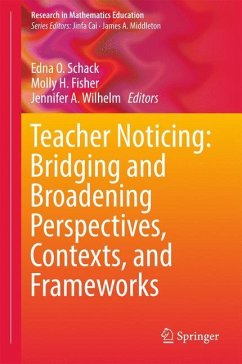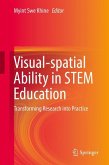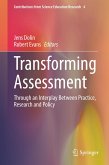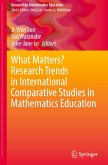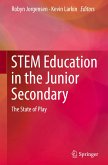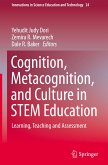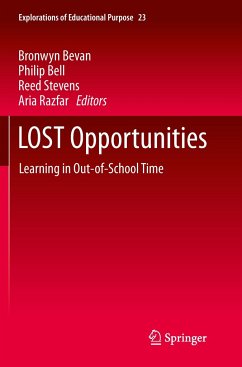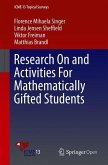Teacher Noticing: Bridging and Broadening Perspectives, Contexts, and Frameworks
Herausgegeben:Schack, Edna O.; Fisher, Molly H.; Wilhelm, Jennifer A.
Teacher Noticing: Bridging and Broadening Perspectives, Contexts, and Frameworks
Herausgegeben:Schack, Edna O.; Fisher, Molly H.; Wilhelm, Jennifer A.
- Gebundenes Buch
- Merkliste
- Auf die Merkliste
- Bewerten Bewerten
- Teilen
- Produkt teilen
- Produkterinnerung
- Produkterinnerung
This book reflects on the continuing development of teacher noticing through an exploration of the latest research. The authors and editors seek to clarify the construct of teacher noticing and its related branches and respond to challenges brought forth in earlier research. The authors also investigate teacher noticing in multiple contexts and frameworks, including mathematics, science, international venues, and various age groups.
Andere Kunden interessierten sich auch für
![Visual-spatial Ability in STEM Education Visual-spatial Ability in STEM Education]() Visual-spatial Ability in STEM Education103,99 €
Visual-spatial Ability in STEM Education103,99 €![Transforming Assessment Transforming Assessment]() Transforming Assessment117,99 €
Transforming Assessment117,99 €![What Matters? Research Trends in International Comparative Studies in Mathematics Education What Matters? Research Trends in International Comparative Studies in Mathematics Education]() What Matters? Research Trends in International Comparative Studies in Mathematics Education101,99 €
What Matters? Research Trends in International Comparative Studies in Mathematics Education101,99 €![STEM Education in the Junior Secondary STEM Education in the Junior Secondary]() STEM Education in the Junior Secondary74,99 €
STEM Education in the Junior Secondary74,99 €![Cognition, Metacognition, and Culture in STEM Education Cognition, Metacognition, and Culture in STEM Education]() Cognition, Metacognition, and Culture in STEM Education103,99 €
Cognition, Metacognition, and Culture in STEM Education103,99 €![LOST Opportunities LOST Opportunities]() LOST Opportunities74,99 €
LOST Opportunities74,99 €![Research On and Activities For Mathematically Gifted Students Research On and Activities For Mathematically Gifted Students]() Florence Mihaela SingerResearch On and Activities For Mathematically Gifted Students8,99 €
Florence Mihaela SingerResearch On and Activities For Mathematically Gifted Students8,99 €-
-
-
This book reflects on the continuing development of teacher noticing through an exploration of the latest research. The authors and editors seek to clarify the construct of teacher noticing and its related branches and respond to challenges brought forth in earlier research. The authors also investigate teacher noticing in multiple contexts and frameworks, including mathematics, science, international venues, and various age groups.
Produktdetails
- Produktdetails
- Research in Mathematics Education
- Verlag: Springer / Springer International Publishing / Springer, Berlin
- Artikelnr. des Verlages: 978-3-319-46752-8
- 1st ed. 2017
- Seitenzahl: 556
- Erscheinungstermin: 24. Mai 2017
- Englisch
- Abmessung: 241mm x 160mm x 36mm
- Gewicht: 1016g
- ISBN-13: 9783319467528
- ISBN-10: 3319467522
- Artikelnr.: 45610734
- Research in Mathematics Education
- Verlag: Springer / Springer International Publishing / Springer, Berlin
- Artikelnr. des Verlages: 978-3-319-46752-8
- 1st ed. 2017
- Seitenzahl: 556
- Erscheinungstermin: 24. Mai 2017
- Englisch
- Abmessung: 241mm x 160mm x 36mm
- Gewicht: 1016g
- ISBN-13: 9783319467528
- ISBN-10: 3319467522
- Artikelnr.: 45610734
Dr. Edna O. Schack is a professor of education and Co-Director of MSUTeach at Morehead State University in Morehead, KY where she has taught prospective elementary teachers since 1987. She is the recipient, along with several Kentucky colleagues, of two National Science Foundation grants investigating prospective elementary teacher professional noticing of children's early numeracy and early algebraic thinking. Her interests also include investigating key practices prospective teachers need to develop a foundation for growth as an effective teacher. Involved in the Kentucky Committee for Mathematics Achievement since its inception in 2005, she served as the Chair (2010-2012) and is currently the Assistant to the Chair. She has published in both research and practitioner journals. Dr. Molly H. Fisher is an Associate Professor of Mathematics Education in the STEM Education Department at the University of Kentucky. She is also the Director of Graduate Studies where she directs theM.S. in STEM Education program as well as the STEM Education strand of the Ph.D. program in Education Sciences. She holds a B.A. in Mathematics, M.A. in Mathematics Education, and a Ph.D. in Curriculum Instruction (with an Urban Mathematics Education specialization) from the University of North Carolina at Charlotte. She is a former high school Mathematics and Computer Science teacher with a myriad of experiences teaching in the classroom and online. Her research focuses on the professional noticing of children's mathematical thinking of preservice elementary teachers through the lens of the Stages of Early Arithmetic Learning (SEAL) and Algebraic Thinking. Additionally, she is passionate about the support and mentoring of new teachers and she studies the stress, burnout, and retention of inservice teachers, especially secondary mathematics teachers. Dr. Jennifer A. Wilhelm is a Professor of Science and Mathematics Education at the University of Kentucky. She holds a Ph.D. in Science/Mathematics Education from the University of Texas at Austin and a M.S. in Physics from Michigan State University. Dr. Wilhelm's primary research interest involves the design of project-enhanced, interdisciplinary learning environments. She investigates how people understand science and mathematics concepts as they participate in project work that demands the integration of multiple content areas. Dr. Wilhelm's research focuses on project pieces that are inherently interdisciplinary and fruitful for contextualized student learning. Some examples include examining the development of students' science and mathematics content understanding as they engage in studies of motion and rate of change; sound waves and trigonometry; and the moon's phases, the moon's motion, and spatial geometry.
Introduction: Probing Beneath the Surface of Experience.- Teacher Noticing in Various Grade Bands and Contexts: Commentary.- From a Framework to a Lens: Learning to Notice Student Mathematical Thinking.- Investigating Secondary Preservice Teacher Noticing of Students' Mathematical Thinking.- A Case Study of Middle School Teachers' Noticing during Modeling with Mathematics Tasks.- Using Video of Peer Teaching to Examine Grades 6-12 Preservice Teachers' Noticing.- Examining Student Thinking through Teacher Noticing: Commentary.- Mathematical Teacher Noticing: The Key to Learning from Lesson Study.- Learning to Notice Student Thinking about the Equal Sign: K-8 Pre-service Teachers' Experiences in a Teacher Preparation Program.- Following a Teacher's Mathematical and Scientific Noticing across Career Progression from Field Experiences to Classroom Teaching.- Noticing Students' Conversations and Gestures during Group Problem-Solving in Mathematics.- Extending Equitable Practices in Teacher Noticing: Commentary.- "Everything Matters": Mexican-American Prospective Elementary Teachers Noticing Issues of Status and Participation While Learning to Teach Mathematics.- "Maybe It's a Status Problem." Development of Mathematics Teacher Noticing for Equity.- Making Visible the Relationship between Teachers' Noticing for Equity and Equitable Teaching Practice.- Complexities in Measuring Teacher Noticing: Commentary.- Measuring Noticing Within Complex Mathematics Classroom Interactions.- Using Mathematical Learning Goals To Analyze Teacher Noticing.- Measuring Elementary Mathematics Teachers' Noticing: Using Child Study as a Vehicle.- Investigating the Relationship Between Professional Noticing and Specialized Content Knowledge.- A Standardized Approach for Measuring Teachers' Professional Vision: The Observer Research Tool.- Challenges in Measuring Secondary Mathematics Teachers' Professional Noticing of Students' Mathematical Thinking.- Exploring the Boundaries of Teacher Noticing: Commentary.- Shifting Perspectives on Preservice Teachers' Noticing of Children's Mathematical Thinking.- Curricular Noticing: Theory on and Practice of Teachers' Curricular Use.- The FOCUS Framework: Characterising Productive Noticing during Lesson Planning, Delivery, and Review.- Noticing Distinctions Among and Within Instances of Student Mathematical Thinking.- Teachers' Professional Noticing from a Perspective of Key Elements of Intensive, One-to-one Intervention.- The Ascendance of Noticing: Connections, Challenges, and Questions
Introduction: Probing Beneath the Surface of Experience.- Teacher Noticing in Various Grade Bands and Contexts: Commentary.- From a Framework to a Lens: Learning to Notice Student Mathematical Thinking.- Investigating Secondary Preservice Teacher Noticing of Students' Mathematical Thinking.- A Case Study of Middle School Teachers' Noticing during Modeling with Mathematics Tasks.- Using Video of Peer Teaching to Examine Grades 6-12 Preservice Teachers' Noticing.- Examining Student Thinking through Teacher Noticing: Commentary.- Mathematical Teacher Noticing: The Key to Learning from Lesson Study.- Learning to Notice Student Thinking about the Equal Sign: K-8 Pre-service Teachers' Experiences in a Teacher Preparation Program.- Following a Teacher's Mathematical and Scientific Noticing across Career Progression from Field Experiences to Classroom Teaching.- Noticing Students' Conversations and Gestures during Group Problem-Solving in Mathematics.- Extending Equitable Practices in Teacher Noticing: Commentary.- "Everything Matters": Mexican-American Prospective Elementary Teachers Noticing Issues of Status and Participation While Learning to Teach Mathematics.- "Maybe It's a Status Problem." Development of Mathematics Teacher Noticing for Equity.- Making Visible the Relationship between Teachers' Noticing for Equity and Equitable Teaching Practice.- Complexities in Measuring Teacher Noticing: Commentary.- Measuring Noticing Within Complex Mathematics Classroom Interactions.- Using Mathematical Learning Goals To Analyze Teacher Noticing.- Measuring Elementary Mathematics Teachers' Noticing: Using Child Study as a Vehicle.- Investigating the Relationship Between Professional Noticing and Specialized Content Knowledge.- A Standardized Approach for Measuring Teachers' Professional Vision: The Observer Research Tool.- Challenges in Measuring Secondary Mathematics Teachers' Professional Noticing of Students' Mathematical Thinking.- Exploring the Boundaries of Teacher Noticing: Commentary.- Shifting Perspectives on Preservice Teachers' Noticing of Children's Mathematical Thinking.- Curricular Noticing: Theory on and Practice of Teachers' Curricular Use.- The FOCUS Framework: Characterising Productive Noticing during Lesson Planning, Delivery, and Review.- Noticing Distinctions Among and Within Instances of Student Mathematical Thinking.- Teachers' Professional Noticing from a Perspective of Key Elements of Intensive, One-to-one Intervention.- The Ascendance of Noticing: Connections, Challenges, and Questions
"It is a great book for those who are developing an interest in teacher noticing. New researchers could use this book to identify the various themes of the noticing framework and specific research questions. ... I hope many people will read this book and reflect on the simple yet powerful relationship between what the math teacher notices in classroom interactions, how the teacher processes the information, and how the teacher acts on the insight to impact student learning." (Woong Lim, MAA Reviews, June, 2018)

